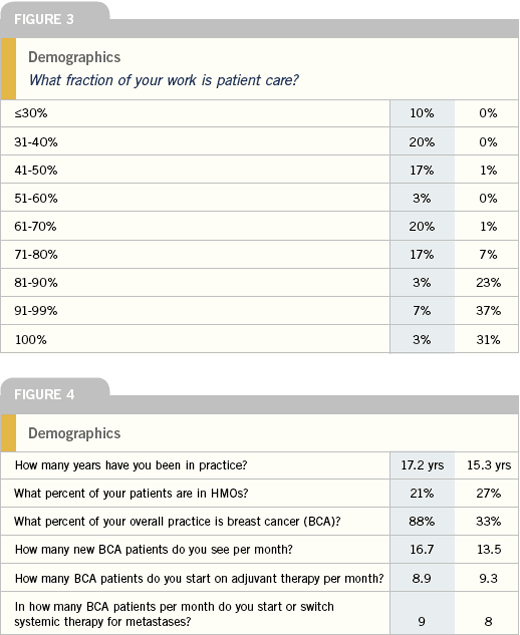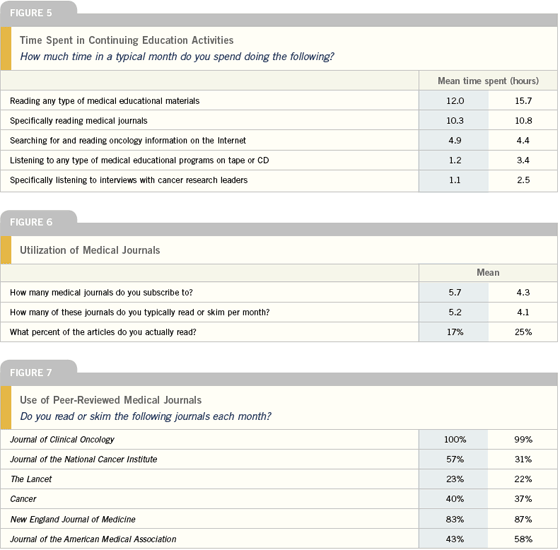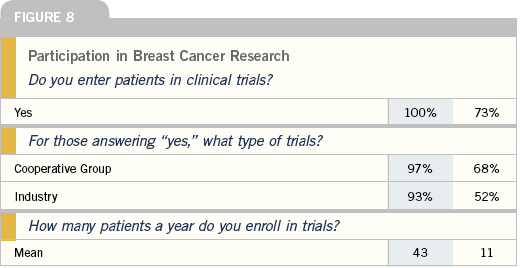|


Differences between academic and community practice
I view myself primarily as a researcher and secondarily as a treating physician. For most community practitioners, it is probably reversed. I think generally your perspective is based on the time you spend doing specific activities.
The amount of time I spend taking care of patients is probably considerably less than the time spent by most private oncologists, and, therefore, the volume of patients I see is less. However, in terms of complexity, some of my colleagues in practice send me the more difficult, problematic, puzzling cases.
So I see a somewhat different spectrum of patients, but I’m asking the same questions as my community-based colleagues. We both want to translate the same recent research findings into state-of- the-art patient care. So there are probably more similarities than differences.
— Gary Lyman, MD, MPH
Everybody wants the same thing in the end, but we all know there are different ways of achieving it and in general, I think the community oncologist and the research oncologist face different pressures. The community oncologist faces the pressure of getting people in and out of the office for understandable economic reasons while the research oncologist faces pressures related to doing research and following institutional values.
Clinical practice at a research institution tends to be more sub-specialized and therefore you find experts in one particular area whereas, in the community oncology setting, a physician may be good at a lot of different things, but may not be up to speed on everything. So it depends on the patient and the situation. For some bread-and-butter type cases, I think a community oncologist might be as effective, if not more effective, than a research oncologist in terms of caring for the patient. However, when there are more esoteric situations where a research study may be a better option or one of the only options, then someone might be better served in a research setting.
— Ann Partridge, MD

Click here to see image
I believe the medical oncologist who treats only breast cancer and attends either the San Antonio Breast Cancer Symposium or the breast cancer portion of the ASCO meeting is better able to extract small details that will change their practice patterns than the general oncologist who needs to attend lectures on others cancers as well. In addition, general oncologists don’t attend meetings on translational biology and may not be in tune with new studies that are evolving. We are beginning to evaluate treatments for subsets of patients rather than treating all patients with the same approach. General oncologists may be seeing patients in these subsets, but may not be aware that one treatment is superior until that information becomes widely disseminated. There may be a time delay in changing practice patterns for the general oncologist versus the medical oncologist who specializes in breast cancer.
— Joanne L Blum, MD

Staying up to date with emerging data
More and more, I look at journals electronically. In fact, I’m changing all my subscriptions because electronic access has been revolutionary, allowing me to download an electronic copy onto my hard drive to keep in a filing system. Personally, I’ve found that this has increased my ability to scan the literature and to organize my references.
Having said that, the number of medical and scientific journals continues to mushroom. There are tens of thousands of journals, and one has to prioritize. I have my internal list of the major publications, both general medical and oncology specific, that I feel I have time to personally access.
I also scan Medline, looking for the types of data that my group works with, particularly meta-analyses, systematic reviews and randomized controlled trials. Fortunately, the filter mechanisms available through the National Library of Medicine narrow down the number of articles each month so that I can scan through them, at least with regard to breast cancer.
However, trying to keep up with the literature is still a major challenge, so like everyone else, I turn to medical education programs, particularly those where leaders in the field whom I respect communicate their impressions and interpret what’s most relevant and what’s the takeaway message. Even in breast cancer, it’s virtually impossible to stay current with every issue that’s actively being discussed and researched.
— Gary Lyman, MD, MPH
I spend a lot of time reading medical journals, including the Journal of the American Medical Association, the New England Journal of Medicine and the Journal of Clinical Oncology. I read all of the articles related to breast cancer, but I also try to read some of the review articles and articles on new drugs. I read articles on diseases other than breast cancer, but I don’t spend nearly as much time on those.
I read select articles in Nature and Science to stay abreast of the basic science issues. I read a lot of the news and views articles from both of those journals. I also read Cancer Research, although very selectively. I may read the cover article and possibly one or two articles related to breast cancer. I receive the American Journal of Human Genetics and Nature Genetics because I’m involved with the genetic counseling program at our institution and I look for articles related to BRCA-1 and BRCA-2.
— Joanne L Blum, MD
I rely on four journals. I read JCO thoroughly every month and scan the JNCI, the New England Journal of Medicine and JAMA for cancer-related articles. Sometimes the web-based publication summaries catch my attention.
— Generosa Grana, MD
I keep up-to-date through my clinical practice and discussing cases with the core group at my institution. I also speak at a number of meetings, where I have the opportunity to hear other faculty present. Finally, I peruse the Journal of Clinical Oncology fairly religiously and review articles submitted for publication.
— Charles L Loprinzi, MD
Participation in clinical trials I supervise most of the breast cancer clinical trials in oncology at my center. I participate in Phase II and Phase III studies in both the adjuvant and metastatic setting. I’ve had minimal involvement in Phase I trials as well. I’m also involved in studies on the psychological implications of genetic counseling for patients. I direct the genetic counseling program at our institution, and we have approximately four collaborative studies with other centers that deal with genetics.
— Joanne L Blum, MD
Select publications
|

